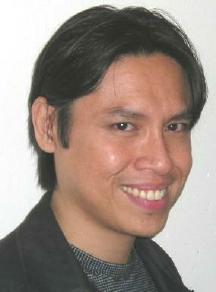The Independent Newsweekly
| National
Catholic Reporter
The Independent Newsweekly |
| Global Perspective |
| Nobember 19, 2003 |
Vol. 1, No. 33
|

Antonio D. Sison is a doctoral student at the Catholic University of Nijmegen in the Netherlands, doing research on systematic theology and Third Cinema. He wrote the screenplay for "9 Mornings," a film from the Philippines. He has written for the online Journal of Religion and Film and has contributed a chapter to the anthology Representing Religion in World Cinema: Mythmaking, Filmmaking, Culturemaking for Palgrave-Macmillan. Few films dare to examine how the causal structures of inequality that impact on two-thirds of the global population square with the God who is mindful of suffering humanity. |
Third Cinema and the God of the edgeBy Antonio D. Sison NIJMEGEN, The Netherlands -- "The Philippines is a product of 300 years in a Spanish convent and 40 years of Hollywood." This imaginative phrase maps the complicated sociocultural milieu of my home country. After centuries of multiple colonizations, the Philippines is the only predominantly Catholic nation in Asia and the fifth largest film industry in the world (after, in order, India, the United States, Japan and France). This probably offers a clue as to why I chose to study the confluence of theology and cinema. Some of my most profound religious experiences have occurred in the darkened halls of theaters. There, I discover the many delicate turns in which the divine presence can be mirrored in exemplary films. But there seems to be a dearth in the cinematic representations of the God of the edge, the God who exercises a preferential option for the suffering peoples of the Third World. A number of contemporary political films hinge on themes of justice. Recent Hollywood notables include "Erin Brockovich" and "A Civil Action." But few films dare to examine how the causal structures of inequality that impact on two-thirds of the global population square with the God who is mindful of suffering humanity. In my doctoral research, I have found that a film category known as "Third Cinema" works to address this oversight. Third Cinema is a type of political film grounded in the experiences of the Third World. Arising from Grupo Cine Liberacion (Cinema of Liberation Group), a social and aesthetic movement founded in Latin America in the late 1960s, Third Cinema seeks to portray a Third World vision of social and cultural emancipation. It does not capitalize on the "shock value" of Third World misery; rather, it interrogates and judges the various forces that perpetuate inequality and injustice. From the Third Cinema perspective, the divine is identified as the hope-inspiring power in the quest for liberation and social change. A unique feature of Third Cinema is the way in which it works out its message through the use of stylistic strategies such as editing, composition, camera angling and resonant symbolism. "Perfumed Nightmare" (Kidlat Tahimik, 1976), for instance, represents the divine as the God who gives hope and strength in the Filipino struggle for greater equality. The film achieves this by appropriating biblical symbolism and employing clever camera angles. In one scene meant to critique unjust socioeconomic structures, the protagonist is shown pelting a huge mall with small stones. The mall functions as a symbol of injustice, as it was earlier established that its construction resulted in the displacement of small-scale businesses. Strategic camera angling dramatizes the size disparity between the man and the mall, making the man's action seem even more absurd. But a closer look reveals that it is a scene that mirrors the David and Goliath story. It is the power of God, not David's puny stones, that topples Goliath. "Perfumed Nightmare" is setting up its eventual proposal that the liberative presence of the divine is the ultimate power that can address the problem of massive inequality. "Romero" (John Duigan, 1989), another example of Third Cinema, dramatizes the cost of discipleship in the life of martyred Archbishop Oscar Arnulfo Romero of San Salvador. It portrays the archbishop as a prophet who speaks on behalf of the voiceless oppressed. The film frequently employs wide-angle camera shots to frame the Romero character as he is immersed in the community in need of salvation -- torture victims, oppressed women, defenseless children and the elderly. The wider framing, in its capacity to capture group action, works to emphasize social commitment rather than individual psychology. As such, the wide-angle shots support the portrayal of Romero as a good shepherd in solidarity with his people. Other Third Cinema titles worth looking into include the Bollywood epic "Lagaan" (Ashutosh Gowariker, 2001), the British-produced "Bread and Roses" (Ken Loach, 2001), the Filipino film "Dekada 70" (Chito Rono, 2002) and "Divine Intervention" (Elia Suleiman, 2002), one of the rare films coming out of occupied Palestine. Like "Perfumed Nightmare" and "Romero," these films employ stylistic strategies to examine the various social, cultural and economic forces that perpetuate inequality and oppression. They also acknowledge the need for a higher power, a power greater than human effort, in the Third World quest for liberation. Inasmuch as the Third World continues to struggle in the crucible of structural injustice, the clear-eyed lens of Third Cinema provides life-affirming glimpses of the God of justice and hope. For at least this Third World scholar committed to the study of theology and cinema, Third Cinema is an alternative path to discovering the liberative presence of the divine, a light in the darkened hall of the theater.
|
| Copyright
© 2003 The National Catholic Reporter Publishing Company, 115
E. Armour Blvd., Kansas City, MO 64111
TEL: 1-816-531-0538 FAX: 1-816-968-2280 |